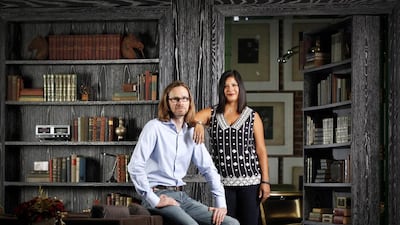Nestled in the Jackson Square neighbourhood near San Francisco’s northeastern waterfront sits the Battery, an extravagant, members-only social club.
The ground floor is filled with dark wood tables, leather sofas and local artwork, all surrounding a glass and steel staircase. On the second floor, past antique phone booths and a piano bar with a Steinway, a passageway hidden behind a bookcase leads to a private card room.
Fees are $2,400 a year, not including food, drink, or access to the gym or one of the 14 hotel suites. “I see how it can represent extreme wealth,” says Xochi Birch, who cofounded the club with her husband, Michael, a year ago.
In 2008 the Birches were on the right side of a bad deal, selling their now dormant social network Bebo to AOL for US$850 million. Last year they got it back from buyout firm Criterion Capital Partners for $1m.
The couple opened the Battery last October, amid growing outcries in San Francisco about soaring rents caused by the tech boom, as well as protests against the buses Google and other companies use to transport employees. The club was pilloried as an exemplar of the city’s growing inequality.
The Battery has more than 2,900 members, who must be invited by existing members, and the tech elites spotted there include Sergey Brin, Marissa Mayer and Elon Musk.
On a recent afternoon, members in the bustling central dining room lunched on a menu featuring roasted kabocha squash, lamb sandwiches and day boat scallop risotto. The courtyard was closed off – reserved by Google for meetings.
At a corner booth, the tech investor Jason Calacanis discussed a potential deal. Afterwards, he said he spends at least three days a week at the club.
“The last 12 deals I’ve done, all but two have been closed in that booth,” he says. The Battery “has sort of become the central meeting point”. He adds: “Everybody who is in town is there.”
The Birches say they’re halving their new memberships, from 400 a month to 200, to avoid overcrowding the place.
Amid the 2008 real estate crash, the couple spent $13.5m to buy the four-storey Musto Building.
The 58,000 square foot, century-old property was a multitenant office space that was first a marble warehouse then a sweet factory. The Birches won’t say how much the renovation cost. It was supposed to take three years. It took five.
By last year, the building – which Michael had first intended to house a new company – seemed too ornate and spacious to fill with desks and PCs. He decided to replicate the kind of social club aimed at young professionals he’d seen growing up in London. “People around the world have the same human instinct,” he says. “They want to go out, be social, meet new people and learn new things.”
The Birches have churned through two chefs and two general managers.
They’ve made the food less exotic and are replacing the animal heads, which members have complained about, with models of antique ship hulls.
Although the club has positive cash flow, the Birches say, they don’t expect to recoup their investment. “If you are in the tech world and you want to make more money, you should stay in tech,” Michael says. “We did this because we thought it would lead to interesting things.”
To celebrate its first birthday, the club emailed invitations promising “an evening replete with thrills, depravity, bawdy song, and dance”.
In June a local TV station lambasted the Battery’s members for blocking traffic by double-parking at the club’s valet station.
Private clubs “reinforce elitism and the notion that rich people are better than middle-class or poor people”, says Peter Phillips, a sociology professor at Sonoma State University in Rohnert Park, California.
Xochi, originally from the East Bay, rolls her eyes at the charge. “Beside it being opulent, we want to reach a diverse group. We hope it can be representative of San Francisco,” she says, citing the Battery’s 47 per cent female membership and discounts for people who can’t afford the dues.
As for whether she’s enjoying the club, “Next year we’ll enjoy it,” she says. “For now, we are still trying to make it better.”
business@thenational.ae
Follow The National's Business section on Twitter

